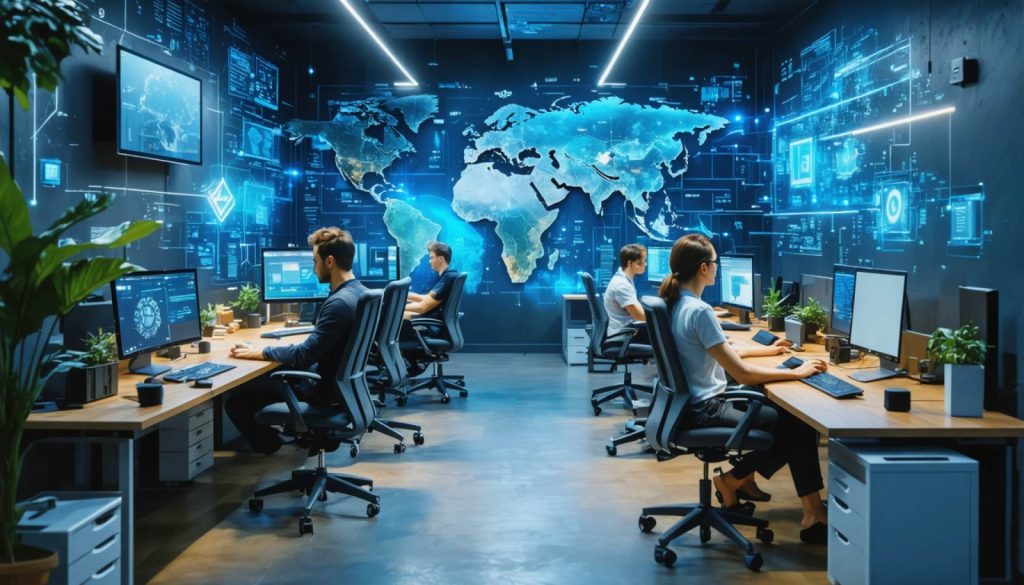
- Meta reduced its workforce in Reality Labs, focusing on efficiency and user experience, specifically affecting Oculus Studios and the Supernatural VR app.
- Microsoft adopted a new strategy, offering underperforming employees severance instead of performance improvement plans, to encourage dynamic productivity.
- Google and Intel adjusted workplace policies, requiring three and four days in-office, respectively, emphasizing hybrid work’s importance to innovation.
- Tech innovations included Xiaomi’s Redmi Watch Move with health features, and Oppo and Vivo’s 5G phones, expanding options for tech enthusiasts.
- Samsung began integrating AI in its consumer electronics in India, aiming to enhance daily life with smarter, interconnected devices.
- These developments highlight a shift in traditional work and innovation, emphasizing adaptability and advancement in the tech industry.
It was a week where corporate titans redefined office norms, and tech innovators unveiled a parade of new gadgets. Amidst these shifts, the aroma of uncertainty loomed in the tech corridors, adding layers of complexity and anticipation to the industry’s landscape.
Meta Cuts and Microsoft’s New Approach: Meta’s Reality Labs trimmed its workforce, affecting Oculus Studios and the beloved Supernatural VR fitness app. In a bid for efficiency, the company stressed its commitment to invigorating the user experience, even as it downsizes. Meanwhile, Microsoft unveiled a strategic shift by offering underperforming employees a severance package, rather than the traditional performance-improvement plan—a move reflecting an implicit push for more dynamic efficiency.
The Hybrid Work Dilemma: Google and Intel, two stalwarts of Silicon Valley, recalibrated their workplace policies. Google has beckoned remote workers back to its campuses, mandating a three-day office presence. Employees now face a choice: embrace the hybrid model or face potential termination. On a parallel track, Intel has instituted a four-day office directive, emphasizing the value of personal collaboration to foster innovation and drive market growth.
Innovation Takes the Stage: Away from corporate strategies, the spotlight shifted to the vibrant unveiling of consumer technology. Xiaomi’s Redmi Watch Move, with its AMOLED screen and health-centric features, aims to captivate fitness aficionados. Oppo’s K13 5G and Vivo’s T4 5G smartphones, boasting impressive battery life and camera capabilities, further enriched the ever-widening spectrum of choices for tech-savvy consumers.
Samsung’s AI Revolution: In an ambitious stride, Samsung integrated AI across its wide array of consumer electronics. Starting in India, the rollout promises smarter appliances, enhancing daily life with seamless interconnectivity.
The undercurrent of these developments is clear: The tech world stands at a crossroads, where traditional work paradigms are challenged, and innovation promises to reshape everyday life. As these dynamic tales unfold, the message resonates loudly—adaptability and innovation are the hallmarks of sustained success in this ever-evolving digital era.
The Week that Transformed Tech and Work: Innovations, Policies, and New Norms
The week brought a whirlwind of developments as tech giants and corporate leaders navigated emerging trends in workplace norms and consumer technology. While leaders like Meta and Microsoft redefined workforce strategies, tech innovators like Xiaomi, Oppo, and Samsung offered glimpses into the future with cutting-edge products. Here’s a deeper dive into the changes and trends, adding context, insights, and practical takeaways for industry followers and technology enthusiasts.
The Corporate Landscape: A New Era of Workforce Strategies
Meta’s Workforce Restructuring
In a landmark move, Meta downsized its Reality Labs division, affecting units like Oculus Studios. This decision underscores the company’s focus on refining user experiences in Virtual Reality and the Metaverse, areas that are both challenging and promising.
Microsoft’s Progressive Approach
In contrast, Microsoft’s novel strategy to handle underperformance involved offering severance packages instead of the usual performance improvement plans. This reflects a potential trend towards creating more dynamic and supportive workplace environments, where stagnant roles are replaced with fresh talent more sustainably.
Hybrid Work Adjustments at Google and Intel
With Google insisting on a three-day office return and Intel mandating four days, the shift back to in-person work raises questions about the future of remote work. While these tech giants emphasize collaboration and innovation, the choice underscores ongoing debates about productivity, cultural cohesion, and employee satisfaction.
Unveiled Innovations: Tech Trends on the Rise
Fitness and Connectivity with Xiaomi and Oppo
Xiaomi’s Redmi Watch Move enters the market with a focus on fitness and health. Its AMOLED screen not only offers vibrant displays but tracks health metrics—ideal for fitness enthusiasts who want smart wearables that combine style with functionality. Simultaneously, Oppo and Vivo’s new smartphones bring advanced battery life and camera capabilities, catering to tech-savvy customers who crave power and multimedia excellence in handheld devices.
Samsung’s AI-Powered Revolution
Samsung’s introduction of AI in home appliances revolutionizes the concept of smart homes. The initial rollout in India marks a step toward more intelligent domestic ecosystems. These smart appliances can significantly optimize energy use and household convenience while integrating smoothly with other smart devices.
FAQs and Market Insights
1. Is remote work completely disappearing?
– While certain companies are requiring more office presence, hybrid models are still prevalent, offering both remote flexibility and opportunities for collaboration.
2. How does Microsoft’s approach to underperformance affect employees?
– By opting for severance packages, employees might face less job security but could benefit from a supportive transition if underperformance persists.
3. What are the consumer benefits of AI integration in Samsung appliances?
– Enhanced energy efficiency, seamless device connectivity, and tailored user experiences are some of the key advantages.
4. What impact does Meta’s restructuring have on VR development?
– While workforce cuts may delay some projects, the restructuring can lead to more focused and rapid advancements in their core offerings.
Actionable Recommendations
– Explore Hybrid Work Models: For companies considering a return to office mandates, balance the benefits of in-person collaboration with the flexibility remote work offers.
– Invest in Smart Tech: Consumers looking to upgrade their home environments should explore AI-integrated appliances for enhanced efficiency and convenience.
– Stay Informed on Industry Trends: Whether it’s workforce shifts or innovative gadgets, being informed helps anticipate changes and seize opportunities.
For more insights on emerging technology trends and workplace innovations, visit Samsung and Microsoft for official announcements and product launches.
Adaptability and innovation continue to steer the future, reminding us that embracing change is crucial for staying ahead in this dynamic digital era.



